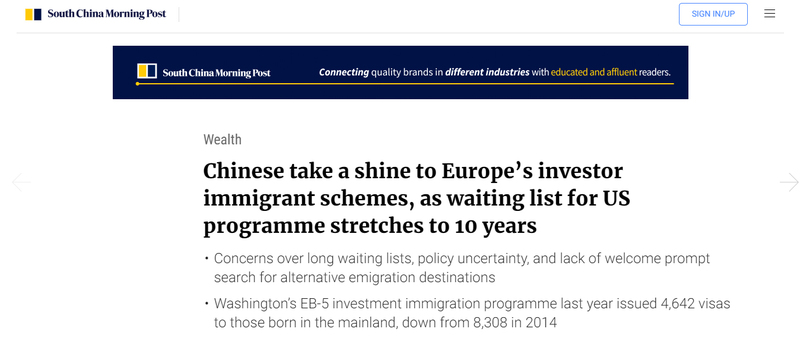Chinese take a shine to Europe’s investor immigrant schemes, as waiting list for US programme stretches to 10 years
Supporters of US President Donald Trump rally for the president during his visit to see the controversial border wall prototypes on March 13, 2018 in San Diego, California. The border visit is Trump’s first trip to California since taking office.
- Concerns over long waiting lists, policy uncertainty, and lack of welcome prompt search for alternative emigration destinations
- Washington’s EB-5 investment immigration programme last year issued 4,642 visas to those born in the mainland, down from 8,308 in 2014
Wealthy Chinese mainlanders are taking a shine to Europe as a potential emigration destination, as they seek out alternatives to the United States, where long processing times and policy uncertainty have put a damper on the appeal of citizenship in the world’s largest economy.
Data from the US State Department shows visas issued to China-born applicants last year under an investment immigration programme called EB-5 dropped by almost half from the peak in 2014.
A total of 4,642 visas were issued to mainland born applicants under the category of employment-based fifth preference (EB-5) in 2018, down from 8,308 in 2014.
Created in 1990, the US EB-5 visa programme allows a foreign national who makes an investment of at least US$500,000 that creates 10 American jobs in a high unemployment or rural area to become a permanent resident, along with his or her family, usually in five to seven years.
It has become one of the most popular immigration programmes in the past few years among Chinese, who make up as much as 90 per cent of the US$50 billion put up by global applicants each year.
America’s EB-5 investor visa programme backlog is putting Chinese capital at risk
The number of Chinese applicants for EB-5 boomed after the financial crisis in 2008. But as more applicants joined the queue and the US tightened scrutiny, processing time has grown to more than 10 years from about a year in 2008, said Dr Tianlong You, a professor in justice studies at Arizona State University.
“Many Chinese nationals are caught in the trade war that highlighted potential national security concerns that could be imposed on them, including those under visa programmes including F-1 students, H-1B employees, as well as EB-5,” he said.
US President Donald Trump discusses immigration during an event with Angel Families in the South Court Auditorium of the White House in Washington DC, on Friday, June 22, 2018.
Jennifer Lai, managing partner and head of North Asia at Henley and Partners, a residency and citizenship advisory firm, said the US, Canada, UK, and Australia, are “always top of the list” when people from China, or Hong Kong are considering relocation because of resources in education, medical care, and investment returns.
“However, in recent years, as these governments tightened scrutiny and quota to Chinese applicants, the processing period is longer with higher uncertainty, and more people are weighing new options in Europe, including the ‘Golden Visa’ programmes introduced by Greece, Spain, Portugal, and Malta,” she said.
US developers feel pinch as Chinese investors pull back from EB-5 programme that offers green card as a reward
A more subtle reason for the shift may be changes in how many Chinese view favoured emigration destinations, she added.
Trade frictions with Washington and the diplomatic row between Beijing and Ottawa over the detention of Huawei Technologies chief financial officer Meng Wanzhou in Vancouver have spurred a rethink among some Chinese when it comes to emigrating to the US or Canada, according to Lai.
“If I am a Chinese and I feel I may not be welcome in this country, I will change my thought,” she said.
European countries that introduced investment immigration programmes in the past few years say that the schemes have been well received on the mainland.
Greece, for instance, has granted 6,824 permits of residence to investors and property owners from China and their family since 2013. Russia ranked No 2 in terms of Greek permits obtained by nationality, at 1,072 during the period.
Under the Golden Visa programme, Athens is offering five-year residency rights to an investor and his immediate family following real estate purchases or strategic investments exceeding 250,000 euros (US$280,610). The visa is a pathway to citizenship after seven years of residency.
“When considering relocation, education for children and the freedom to travel rank among the most valued criteria,” Lai said.
Lai said the residency programmes tied to the European Union were attractive because they provided access to the Schengen Area, a group of 26 countries which have officially abolished passport controls along their mutual borders.
States
- New York
Securities Disclaimer
This website is for informational purposes only and does not constitute an offer or solicitation to sell shares or securities. Any such offer or solicitation will be made only by means of an investment's confidential Offering Memorandum and in accordance with the terms of all applicable securities and other laws. This website does not constitute or form part of, and should not be construed as, any offer for sale or subscription of, or any invitation to offer to buy or subscribe for, any securities, nor should it or any part of it form the basis of, or be relied on in any connection with, any contract or commitment whatsoever. EB5Projects.com LLC and its affiliates expressly disclaim any and all responsibility for any direct or consequential loss or damage of any kind whatsoever arising directly or indirectly from: (i) reliance on any information contained in the website, (ii) any error, omission or inaccuracy in any such information or (iii) any action resulting therefrom.





